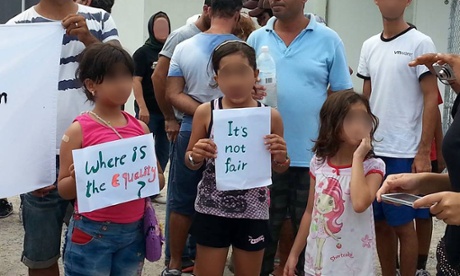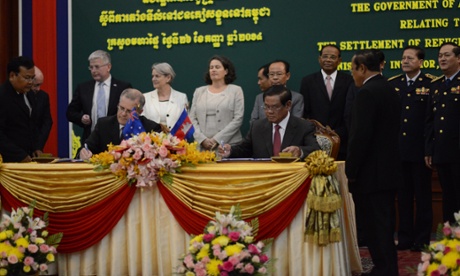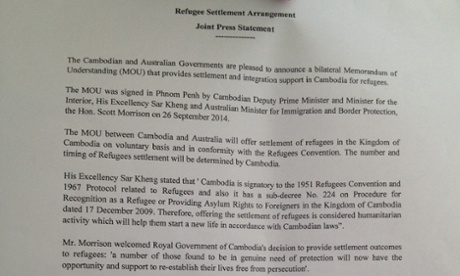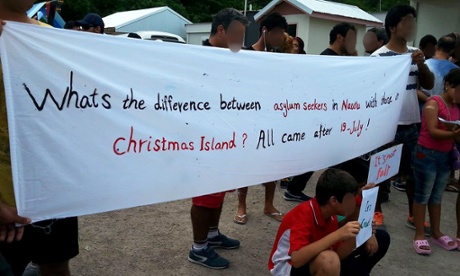Australia signs controversial refugee transfer deal with Cambodia
Nauru refugees protest ‘cruel deal’ as advocates warn Cambodia is too poor and corrupt to take refugees
• Cambodians protest Australia using country as refugee ‘dumping ground’
• Cambodians protest Australia using country as refugee ‘dumping ground’

Families in the Nauru detention centre protest against Australia’s new deal to resettle refugees in Cambodia.
Photograph: Supplied
The Australian immigration minister, Scott Morrison, has signed a
memorandum of understanding in Phnom Penh that cements a plan for
refugees who sought Australia’s protection to be ultimately resettled in
Cambodia instead.
But refugees on Nauru have staged protests saying they will all
refuse to move to Cambodia in what they describe as a “cruel deal” that
will keep them in detention forever.
In an opulent function room under a blazing chandelier, Morrison and
Cambodia’s interior minister, Sar Kheng, signed the necessary documents
without saying a word, the silence interrupted only by the sound of
smashing glass – as a waiter tripped over – and questions shouted out
from a phalanx of journalists gathered behind a gold rope.

Scott Morrison signs the refugee resettlement deal with Cambodia on Friday.
Photograph: Lauren Crothers/The Guardian
A joint statement released after Morrison sped off in a car said:
“Under this MOU, Australia will use its expertise and experience to
assist Cambodia to strengthen settlement support provided to refugees in
Cambodia.

After
Australia’s immigration minister, Scott Morrison, signed the deal with
Cambodia in silence the waiting media was handed this statement.
Photograph: Lauren Crothers/The Guardian
“As part of this commitment, Australia will bear the direct costs of
the arrangement, including initial support to refugees, and relevant
capacity building for Cambodia to ensure it has the appropriate
resources to receive and integrate the refugees successfully.” It said
the deal did not breach the refugee convention.
Over the course of the past few days news of the mostly secretive
agreement – which was proposed by the foreign minister, Julie Bishop, in
February – and which Cambodian foreign ministry officials this week
confirmed would be signed on Friday – has been met with condemnation and
dismay from human rights and refugee advocacy groups.
The statement released after the signing said the two countries would
work with the UN high commissioner for refugees (UNHCR) to implement
the deal. But the UNHCR condemned the deal, expressing deep concern at
the precedent it sets. António Guterres said he hoped Australia would
reconsider.
“We are seeing record forced displacement globally, with 87% of
refugees now being hosted in developing countries,” Guterres said. “It’s
crucial that countries do not shift their refugee responsibilities
elsewhere.
“Refugees are persons who are fleeing persecution or the
life-threatening effects of armed conflict. They are entitled to better
treatment than being shipped from one country to the next.”
UNHCR press officer Vivian Tan later clarified that they were not
involved in the deal. “Our position remains unchanged – we do not have a
role in this bilateral agreement.”
Morrison has said Australia plans to give a further $40m to Cambodia
over the next four years, but insists that this is for development
projects and is not in exchange for the refugees.
Protesters
thronged behind a barricade outside the Australian embassy in Phnom
Penh on Friday morning before the signing ceremony, which was held at the interior ministry in the presence of journalists and officials from both governments.
The protesters argued that Cambodia – where gleaming Range Rovers
co-exist alongside scenes of grinding poverty – is simply ill-equipped
to accept refugees, particularly when its own human rights record has
been so heavily scrutinised, its public health service is substandard
and its courts are mired in corruption.
Misha Coleman, who heads up the Australian churches refugee
taskforce, said: “Hun Sen and his ministers in the Cambodia government
are rich beyond belief – and they didn’t accumulate this wealth on
government salaries. They siphon money from every imaginable source:
commercial contracts, aid projects, you name it.”
In a statement, the Australian Council for International Development referred to the MOU as an “unnecessarily cruel” policy.
“Refugees being sent to Cambodia are being set up to fail in a poor
country,” it quoted the executive director, Marc Purcell, as saying.
“Our aid money should not be used to sweeten the deal with one of our
poorest neighbours. The government’s stated objectives for international
aid are economic development and human development and this just looks
like an inducement to take refugees off Australia’s hands,” he added.

Refugees on Nauru say they will not accept the offer of resettlement in Cambodia.
Photograph: Supplied
Refugees on Nauru say they will all refuse to move to Cambodia and
have staged protests against what they say is a “cruel deal” that will
keep them in detention forever.
A refugee in a Nauru camp told the Guardian on Friday all those found
to be refugees were united in their opposition to being sent to
Cambodia.
“No one will go. People will refuse. We don’t want special treatment,
we only want justice, we only want to be treated fairly. To be thrown
away like rubbish, this is not fair, this is not what Australia should
do.”
He said refugees and asylum seekers felt trapped on the Pacific
island. “This is a cruel deal. Where can we go? We are not safe in our
home countries, we cannot go to Cambodia, we are just abandoned here.”
Protests began on the island Thursday night after refugees and asylum
seekers were shown a video – featuring Morrison – telling them the
reintroduction of temporary protection visas would not apply to them.
“If you are currently on … Nauru, you will not be transferred to
Australia,” Morrison said. “You will remain there until you either
choose to return [home] or are resettled somewhere else other than
Australia.”
The refugees on Nauru have been found by Australia to have a
‘well-founded fear’ of persecution if they are sent home. It is illegal
for Australia to forcibly send them back to their country of origin.
Refugees said the protests were peaceful, but that some had demanded
the locked gates be opened so they could protest outside. Police
arrested several demonstrators. It is unclear how many.
The protests continued on Friday in the children and family camp. Men
held a banner saying “what’s the difference between asylum seekers in
Nauru with those on Christmas Island?” Children carried signs that read
“it’s cruel”, and “it’s not fair.” Officials from the immigration
department who visited camps were shouted at and told to leave.
“People are so angry, they are so distressed,” the refugee told
Guardian Australia. “People don’t know what to do, they are suicidal.
They say ‘this is not fair’, everybody else gets to go to Australia
except us.”
The UN refugee agency said that as at 31 August there was a total of
1,084 people on Manus Island and 1,233 people in Nauru. Cambodia
currently hosts 70 refugees and 20 asylum-seekers.


No comments:
Post a Comment